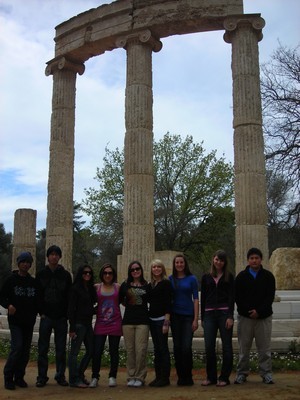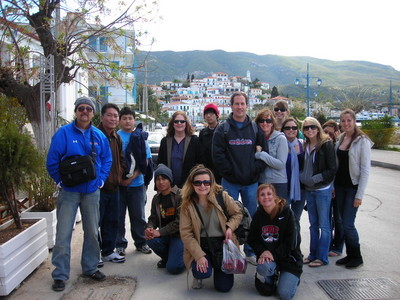LIVING HISTORY
Their feet tread on earth that had been the home to ancient civilizations' hopes, fears, achievements and failures.
During spring break, a group of teenagers from Bishop Gorman High School visited Greece and Turkey to learn about the Olympics and cultural differences.
To fully experience the historical value of the trip, the teens met with Olympian Vitaly Scherbo, who now lives in Las Vegas, to talk with him about the distinctions between American and Greek lifestyles as well as the differences in how the Olympics are celebrated in European nations.
Scherbo competed in the Olympics for just about every form of gymnastics imaginable. He took part in the 1992 and 1996 Olympic games in team competition, the pommel horse, rings, the vault and parallel bars.
Scherbo explained to the students that in Europe, the Olympics and Olympians are treated with deep respect and admiration.
He even appeared in the music video "Revolution Earth" by the B-52's.
"Here in America, people don't really know who I am," says Scherbo. "However, in Belarus, I am treated like a hero. The people of Belarus have even built a monument of me."
Scherbo gave the students insight into the history of the Olympics and how Olympians must train every day.
A week after meeting with him, the students hurried off for an experience of a lifetime.
The group first landed in Athens.
There, they visited the Acropolis, the Parthenon, the Agora and several other historical Greek and Olympic sites. Coincidentally, they were in Athens the day the 2008 Olympic Game torch was lit, and the saw the site where the flame was ignited.
They also visited Olympia where the first Olympic Games were held.
"The trip really opened me to a whole new world," says Monica Lubawy, a 16-year-old sophomore. "I saw ancient places from textbooks. Seeing them in person and imagining what they may have looked like when they were in use took the experience to a whole new level."
Lubawy and the other students not only saw historical sites, but they also became aware of several cultural divides between the United States and Greece.
"The biggest cultural difference was probably the way people dressed," she says. "Here in America, you can walk down the street in shorts and a tank top with no problems. But in Greece and especially Turkey, it's considered disrespectful. When in religious places, you had to make sure that your shoulders and knees were covered."
The students found out about the strict dress code in Greece firsthand when three of the female students wore hiking shorts down to the hotel lobby one morning.
"Everyone was staring at us," says Destinie Jones, an 18-year-old senior, grimacing as she continues. "It was very unnerving. After a few minutes of being gawked at, I made the decision to head back up to my room and change."
Another unique experience the students witnessed was a Greek curse known as the "Evil Eye," which doesn't involve the eye at all.
"In Greece, when someone points their palm at you, it is 10-times worse than flashing the middle finger here in America," says Jones. "It's basically cursing not only the person, but their family as well."
"This gesture is the worst possible you can make toward a Greek; that is why, traditionally, Greeks wave with their palms away from people," says Joanne Andrews, a teacher from Bishop Gorman who supervised the trip.
Despite the cultural differences, the students learned much about the history of Greece and the Olympics. "The Olympics are a huge deal in Europe," says Lubawy. "In Europe, participating in the Olympics in any way is an honor, and that was something I couldn't fully appreciate until I saw it in person."
R-Jeneration


















